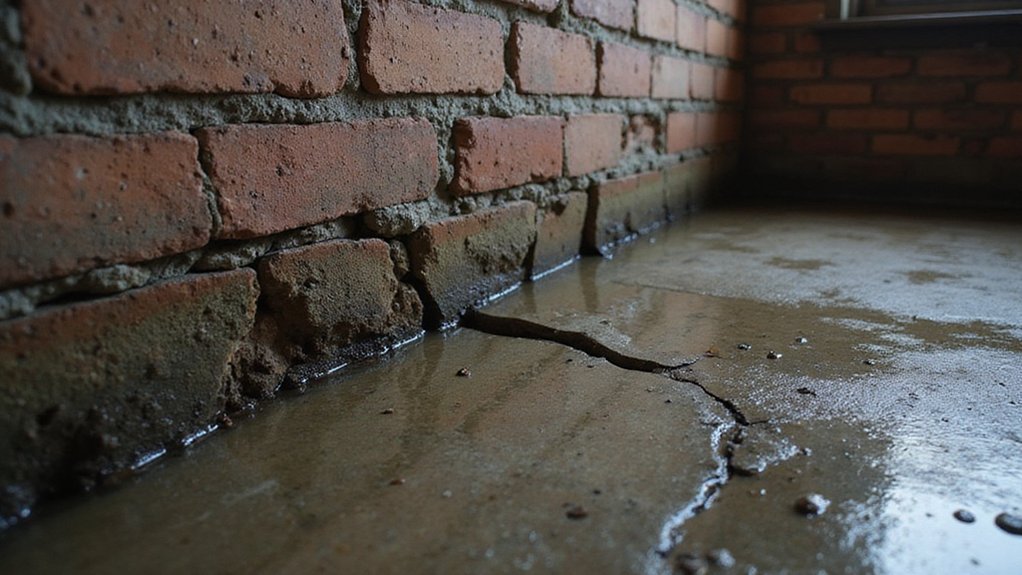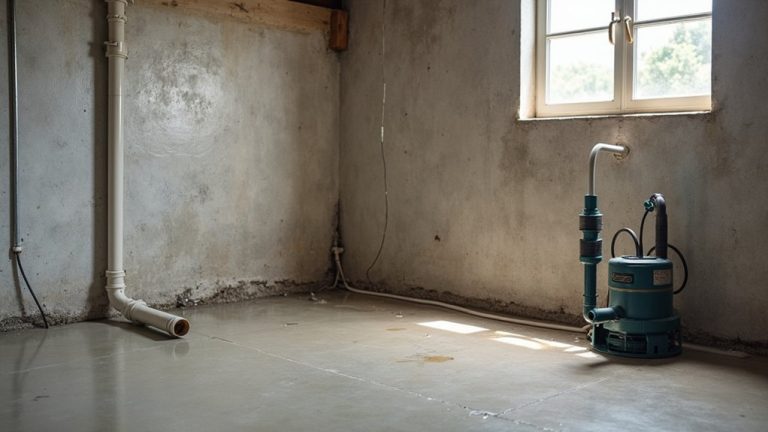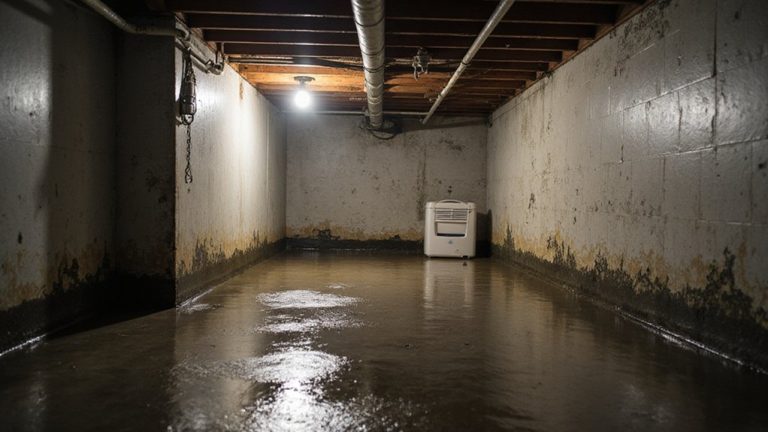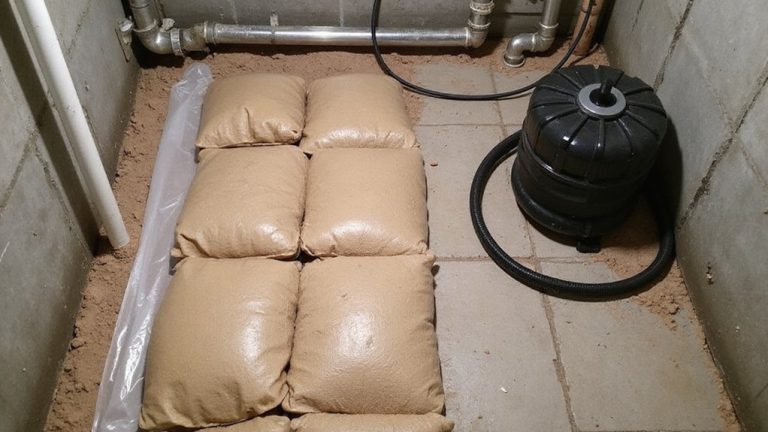Basement water leaks are a serious problem that can’t be ignored. You’ll spot the signs – musty odors, visible stains, crumbling concrete. But finding the source is key. Inspect for cracks, holes, or foundation issues. Use a moisture meter to pinpoint problem areas. With the right fixes, you can prevent further water damage and costly repairs. Let’s plunge into the details and get your basement waterproofed before it’s too late.
Common Signs of Basement Water Leaks
If your basement is experiencing water leaks, there are several common signs you’ll want to look out for. One telltale sign is a musty odor, which can indicate the presence of excess moisture.
You may also notice visible water stains on the walls, floors, or ceilings, which can be a clear indication of a leak. Additionally, you might see discoloration or crumbling of the concrete or drywall, further confirming the issue. Paying close attention to these common signs can help you identify and address basement water leaks before they cause extensive damage to your home. Powdery white deposits on basement walls can signal potential water intrusion and should be investigated immediately.
Identifying the Source of the Leak
Identifying the source of the leak is key to resolving the issue effectively. Start by inspecting your basement walls and floors for cracks, holes, or structural weaknesses that could be allowing water to enter. Pay close attention to areas near the foundation, as fluctuations in the water table can cause leaks. Foundation structural issues may stem from soil pressure and poor land grading, which can lead to significant water infiltration problems.
If you can’t locate the source visually, try using a moisture meter to pinpoint damp spots. Once you’ve identified the problem area, you can address the underlying cause, whether it’s poor drainage, a cracked foundation, or something else. Tackling the root of the issue is the best way to stop leaks for good.
Preventing Basement Moisture Intrusion
How can you effectively prevent basement moisture intrusion? Addressing this issue is vital to maintaining a dry, healthy basement environment. Consider these strategies:
- Guarantee proper subfloor insulation to regulate temperature and prevent condensation buildup.
- Implement effective condensation control measures, such as dehumidifiers or moisture barriers, to manage excess humidity.
- Inspect and seal any cracks or openings in the foundation, walls, or floors to stop water from seeping in.
Basement Waterproofing Techniques
Taking the necessary steps to prevent moisture from seeping into your basement is crucial, but sometimes even the best preventive measures aren’t enough. Basement waterproofing techniques like damp proofing and vapor barriers can help safeguard your home.
Damp proofing involves applying a waterproof coating to the exterior basement walls, while vapor barriers block moisture intrusion from the ground. These methods, combined with proper drainage and sealing, create an all-encompassing defense against basement leaks.
Don’t wait until it’s too late – invest in effective basement waterproofing to protect your home and your family’s comfort and safety.
Repairing Cracks and Holes in the Basement
Even if you’ve taken proactive measures to waterproof your basement, cracks and holes can still develop over time, allowing water to sneak in. To address this, you’ll need to focus on:
- Concrete patching: Use a high-quality concrete patching compound to fill and seal any cracks or holes in the basement floor or walls. This will create a seamless, waterproof barrier.
- Wall sealant application: Apply a durable wall sealant to any cracks or gaps in the basement walls. This will prevent water from seeping through and causing further damage.
- Regular inspections: Regularly check for new cracks or holes and address them promptly to maintain a dry, well-protected basement.
Addressing Plumbing Issues Causing Leaks
If your basement leaks are stemming from plumbing issues, you’ll need to take a closer look. Start by checking any underground pipes running through the basement for cracks or breaks. You may need to have a professional plumber use a camera to inspect the pipes.
Additionally, inspect your water heater for any signs of leaks or damage. Addressing these plumbing problems promptly can help prevent further water damage and mold growth in your basement. With some diligence, you can pinpoint and fix the source of the leaks, protecting your home and your family’s safety.
Maintaining Proper Drainage Around the Home
Proper drainage around your home is essential to preventing basement leaks and water damage. To maintain proper drainage:
- Guarantee your soil grading slopes away from your home’s foundation, guiding water runoff away from the basement.
- Install downspout extensions to direct water at least 6 feet from your home, preventing pooling near the foundation.
- Routinely clear debris from gutters and downspouts to keep water flowing freely and prevent backups.
Addressing drainage issues proactively can save you from costly basement repairs down the line. Take the time to maximize your home’s drainage, and enjoy the peace of mind that comes with a dry, healthy basement.
Monitoring and Ongoing Basement Maintenance
Monitoring and regularly maintaining your basement is imperative to promptly identifying and addressing any potential water leaks or other issues.
Carry out seasonal inspections, checking for signs of dampness, mold, or musty odors. Guarantee proper basement dehumidification to control moisture levels and prevent water damage.
Remain vigilant for cracks, stains, or standing water, which may indicate a more serious problem. Address any concerns quickly before they escalate.
Regular maintenance can help you catch issues early, safeguarding your home and preventing costly repairs down the line. Stay on top of your basement’s condition to protect your investment.
Frequently Asked Questions
How Much Does Basement Waterproofing Typically Cost?
Basement waterproofing typically costs $2,000 to $7,000, but it’s an investment that can elevate your home’s value. Fixing leaks helps you feel more secure and part of a well-maintained community.
Can I Use a Sump Pump to Prevent Basement Leaks?
Installing a sump pump can help prevent basement leaks. Just be sure to maintain it regularly by checking for clogs and ensuring it’s working properly. This’ll keep your basement dry and your home protected.
What Are the Safety Risks of DIY Basement Repairs?
Attempting DIY basement repairs can pose serious electrical hazards and structural instability risks. It’s best to have a professional assess and address any issues to keep your home and family safe.
How Often Should I Inspect My Home’s Foundation?
You should perform regular visual inspections and seasonal moisture checks on your home’s foundation. Staying on top of this will help you catch any issues before they become major problems and protect your investment.
Can Basement Water Leaks Lead to Mold Growth?
Yes, basement water leaks can definitely lead to mold growth. Look for visible moisture stains and persistent musty odors – these are signs that mold may be thriving in your cozy home.



